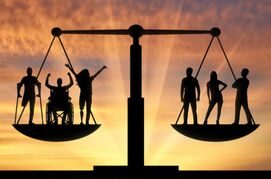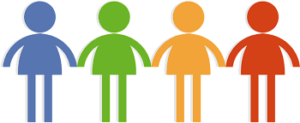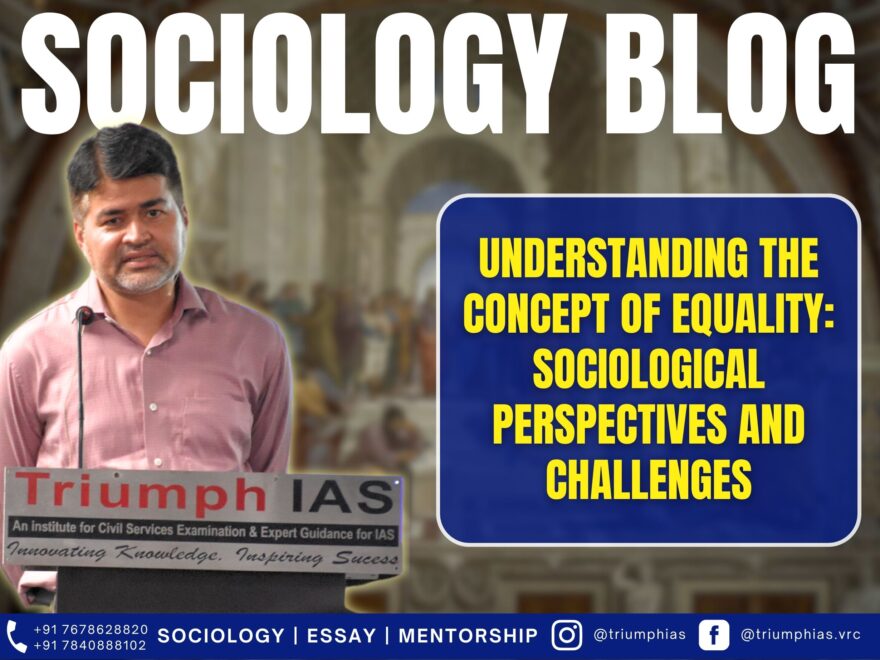Concept of Equality
Relevant for Sociology Paper-1 (Unit-5)

Social equality
The examination of social stratification is inevitably connected to the notions of equality and inequality, which, in a sociological context, encompass “social equality” and “social inequality.” These concepts have been integral to social thought for as long as we can trace, as they are deeply intertwined with our value system. Throughout human history, countless social leaders and reformers have dedicated themselves to the arduous task of establishing equality in society and eradicating, or at least diminishing, inequality. However, despite their tireless efforts, inequality continues to persist, and the realization of true equality remains an elusive aspiration.
- Equality has been an enduring value cherished by people throughout history. However, social inequality has remained an undeniable reality in human group life. J.J. Rousseau, an influential figure during the French Revolution of 1789, aptly acknowledged this truth when he stated, “men are born free and equal but everywhere they are in chains.” The pursuit of equality and the fight against injustice and inequality persist to this day.
- In a broad sense, equality refers to the state of being equal in certain aspects. Social equality, specifically, pertains to a condition in which individuals within a group or society have equal access to wealth, prestige, or power. It exists when all people share power, wealth, or prestige and enjoy equal access to them.
- While the concept of equality carries political, legal, and philosophical connotations, sociological discussions have predominantly centered around equality as a facet of the social context. Since the time of the French Revolution and the rise of liberal democracies in Europe, equality has primarily been understood as political equality. In a liberal democracy, equality entails equal rights among individuals as citizens, encompassing constitutional rights, the right to hold political office, and the exercise of all civic rights.

- Social equality places emphasis on the fair distribution of income and wealth. However, the concern for individual equality within liberal democracies does not give significant weight to income and wealth equality. Critics argue that unequal distribution of these resources undermines other attempts at achieving equality, as individuals with material wealth hold an advantage over their fellow citizens. Sociologists have demonstrated how material resources impact people’s life opportunities, including children’s educational progress. Access to material resources also affects one’s ability to access education and legal representation.
- Despite attempts to provide various social services, such as education, housing, healthcare, and income support, empirical research has shown that inequalities persist and, in some cases, have even worsened. It is noteworthy that the experience of Western liberal democracies has revealed that the majority does not fully embrace the egalitarian objectives of welfare.
To master these intricacies and fare well in the Sociology Optional Syllabus, aspiring sociologists might benefit from guidance by the Best Sociology Optional Teacher and participation in the Best Sociology Optional Coaching. These avenues provide comprehensive assistance, ensuring a solid understanding of sociology’s diverse methodologies and techniques
Concept of Equality, Social Equality, Social Inequality, J.J. Rousseau, Political Equality, Liberal Democracy, Social Stratification, Income Distribution, Wealth Distribution, Access to Resources, Sociological Perspectives, Western Liberal Democracies.
Follow us :


https://t.me/VikashRanjanSociology
Find More Blogs
|
Scope of the subject and comparison with other social sciences |
|||
|
|
|
|
Modernity and social changes in Europe |

